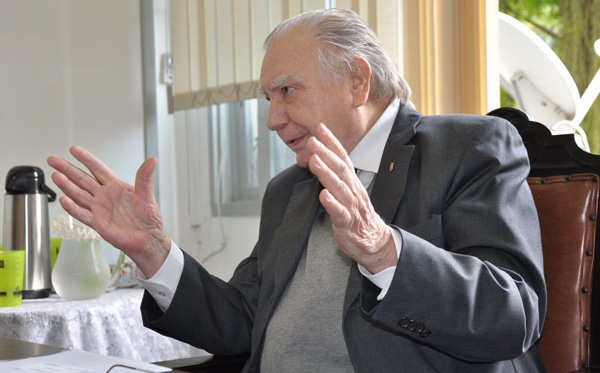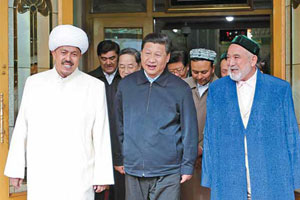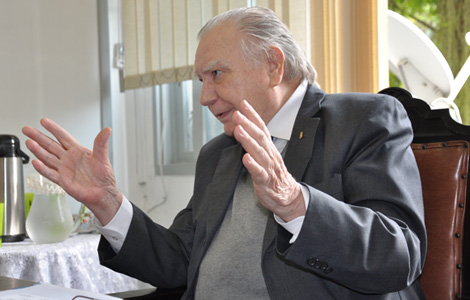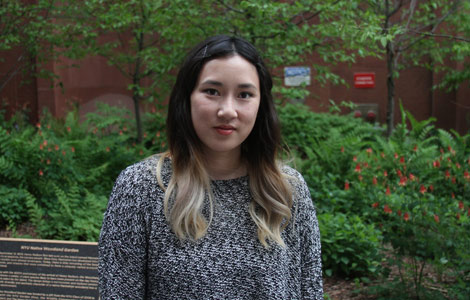Rio Confucius Institute taking root
Updated: 2014-05-15 07:56
By ZHANG FAN in Rio de Janeiro (China Daily USA)
|
||||||||
Though the current number of Chinese language students in Brazil is still limited, the development of a Confucius Institute promises a bright future thanks to the close relationship between China and Brazil, Father Francisco Ivern Simo, vice-president of the Pontifical Catholic University of Rio de Janeiro, said on Wednesday.
At a press conference in Rio de Janeiro, Simo said that Brazil is a multicultural country and warmly welcomes the cultural exchange between China and Brazil.
"Cultural communication between the two languages has a very long history. China is becoming one of the most important countries in the world, especially for Brazil. I see a bright future for a Confucius Institute in Brazil," said Ivern.
"I am very interested in classes at the Confucius Institute and I’ll encourage my friends to learn there too," he added.
Confucius Institute at PUC-Rio, established in 2011, is one of the largest Confucius Institutes in Brazil, offering 13 classes a semester to university students in language and culture.
"The Chinese language courses are part of the curriculum of PUC-Rio, which means students need to pass the exams at the end of the semester to earn credit. It helps make sure that they are learning the material thoroughly, and it also means we have to provide quality education at the same time," said Qiao Jianzhen, the Chinese director of the Confucius Institute at PUC-Rio.
The institute has four Chinese teachers sent from Confucius Institutes Headquarters (Hanban) and two local teachers chosen by PUC-Rio. "Our teachers are very keen to share their knowledge with students. Their professional ethics and passion are the best teaching materials of the Chinese tradition and spirit," Qiao said.
Besides university classes, the institute also offers part-time language classes for adults. More than 100 local Rio residents are enrolled in courses this semester, at a cost of about $ 588 for 45 classes.
"The classes attract students with a variety of social backgrounds, from Congressmen to bus drivers," said Qiao. "We not only teach the language but also introduce Chinese culture, which the students appreciate."
Each year, Hanban provides scholarships to qualified Chinese-language teachers and learners to help them go to China for further training. The scholarships include registration, tuition, accommodation and materials fees.
"I am very interested in Chinese culture and the language and I want to help more Brazilians to understand more about China," said Tomaz M. Fares, a volunteer teacher at the institute and a scholarship winner.
With his scholarship, Fares studied Chinese in the Nanjing University for a year and came back to Rio to teach local students at the institute.
"I can better help Brazilians learn Chinese because I am from the same culture and know how to hold their attention and interest, using such things as games and videos," said Fares. "I also helped my friends learn some simple Chinese phrases and some of them are now taking lessons at the institute."
Fares is applying to graduate school in international relations at Peking University in Beijing, one of China’s top universities. "I want to become a better teacher of Chinese when I come back," he said.
"Brazilians think China is full of opportunities and learning Chinese can help them find better jobs," said Qiao. "It is the most practical reason for learning the Chinese language in this country."
|
 Father Francisco Ivern Simo, the vice president of the Pontifical Catholic University of Rio De Janeiro, told a media conference in Rio De Janeiro on Wednesday that he values the cultural communication between China and Brazil and sees a bright future of Confucius Institute in this country. Zhang Fan / China Daily |
Most Viewed
Editor's Picks

|

|

|

|

|

|
Today's Top News
Chinese general presents gifts
Vietnam's riots 'hurt its image'
Boeing order for 737s shows low-cost travel increasing
PLA chief on trust mission
Travel boom reshapes spending
Man sues Yao Ming for 'misleading' fish oil pill
Spying on millions of Americans in the 'United States of Secrets'
US-China 'Dialogue' will include S. China Sea
US Weekly

|

|















